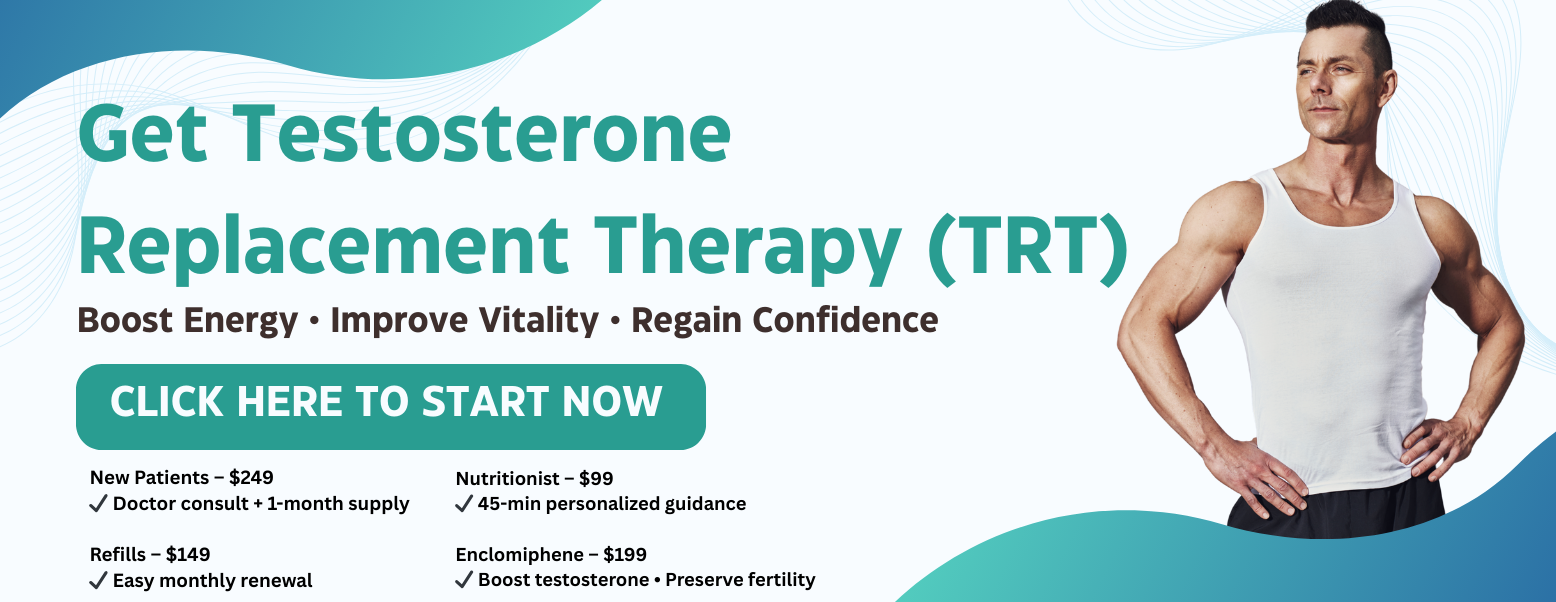Did you just start Testosterone Replacement Therapy (TRT) and notice an increase in hunger? You're not the first. Increased hunger, greater portions during meals, or more frequent snacking are all standard male behaviors for those undergoing TRT.
Is it a side effect—or is this now normal?
With advancements in telehealth platforms, follow-up and management of side effects of TRT have become simpler in 2025. With customized care options, it's easier to identify trends and make adjustments accordingly.
Don’t Wait, Reclaim Your Vitality – Click here to Book Your TRT Consultation Now!
Testosterone, hunger, and metabolism are all interconnected within your body’s hormonal system. Let’s break down the science and understand what’s really happening with appetite during TRT.
Does TRT Truly Increase Appetite? What Science Says
Most ask whether enhanced hunger is psychological or evidence-based. The following is what current evidence indicates about testosterone and appetite:
1. Appetite Changes in TRT Clinical Trials
TRT subjects report a further small rise in calorie intake, particularly in the initial 3 to 6 months. These shifts tend to plateau once hormone levels return to normal.
2. Testosterone's impact on Ghrelin and Leptin levels
Testosterone can suppress leptin (indicating satiety) and stimulate ghrelin (indicating hunger), most commonly in obese males. Together, they can cause a dramatic increase in appetite early in therapy.
3. Bodybuilder & Athlete Anecdotes
Non-scientific, but many athletes and bodybuilders on TRT or steroids report huge spikes of hunger. Again, however, medical TRT—such as that provided by TheKIF—is dosed carefully to prevent adverse reactions.
4. TRT’s Indirect Effects via Muscle Mass Gain
The increased muscle mass burns more calories, resulting in an increased appetite as the body recovers and needs more energy.
5. Long-Term Studies: Sustained Appetite vs Adaptive Hunger
Appetite should stabilize at a baseline over a 12-month period. After the body has adapted to novel levels of hormones, hunger will tend to level out, particularly with the added benefit of a stable lifestyle.
Who Experiences Appetite Changes on TRT? Key Factors
Not all men become hungrier on TRT. Appetite response varies with varying individual and physiological states. Familiarity with them enables you to set expectations and prepare for them.
1. Baseline Testosterone Deficiency Severity
Individuals with extremely low testosterone levels tend to feel hungrier. Balancing hormone levels also replenishes hunger and energy levels, which usually results in temporary surges in food cravings.
2. Type of TRT Administration (Injection vs Gel)
The TRT method is important. Injections release hormones more quickly, potentially producing more intense hunger responses than those from gels or patches released more slowly. This isn't a statement of superiority—simply a requirement for individualized monitoring.
3. Muscle Mass and Body Composition
Additional muscle means additional fuel. If TRT helps build your lean body mass, your body will likely require more food. This can be beneficial if the extra hunger helps you achieve your fitness and nutritional goals.
4. Age and Lifestyle Activity Level
Younger, more active men may experience a greater increase in appetite due to higher metabolic rates. Older or once sedentary men will also feel it when they begin exercising again, though typically less intensely.
5. Pre-existing Metabolic or Emotional Health Issues
Underlying health conditions, such as insulin resistance, metabolic syndrome, or mood disorders, can contribute to an increase in appetite change. TRT will influence emotional eating or energy dysregulation if those were habits prior to treatment.
How to Manage Increased Appetite on TRT Safely?
An enhanced appetite need not compromise your health. The following methods will help you remain in charge without losing the energy that your body needs:
1. Prioritize Protein and High-Fiber Foods
Lean protein and foods that are high in fiber keep one feeling full and aid muscle recovery. Add legumes, lean proteins, and whole grains to send hunger packing and remain energized.
2. Use Meal Timing and Portion Strategies
Split your foods into 4–5 mini portions throughout the day. This helps keep blood sugar stable and prevents impulse snacking. In case of starving, eat a protein-based mini meal rather than packaged foods.
3. Strength Train to Direct Calories Toward Muscle
TRT maximizes muscle-building potential. Channel excess caloric intake towards resistance training to have a better body composition rather than carrying excess fat.
4. Track Food Intake and Hunger Signals
Log your meals with apps. Become aware of the difference between physical and emotional hunger. Mindful eating and staying hydrated can help reduce unnecessary consumption.
5. Seek Nutritional Support if needed
As soon as appetite fluctuations become difficult to control, consult a registered dietitian or TRT expert. Specialists such as The KIF offer monthly telehealth guidance to assist with nutrition and hormonal regulation.
Conclusion
When hormonal shifts occur during TRT, appetite changes can be a sign of positive hormonal changes, but if you don't navigate them correctly, they can be confusing or frustrating. There is no need for you to handle this alone.
The KIF provides expert-guided testosterone replacement services that not only balance your testosterone levels but also support your nutrition, energy, and overall health.
Take your optimized TRT journey today.
- Free TRT Consultation — $0
- New Patient TRT Package — $249
Monthly Subscription — $149 (One month of treatment + a telemedicine visit included)
Whether you feel more excited, more alive, or just more balanced, KIF ensures you stay focused, goal-focused, and supported along the way.
FAQs
1. Is sudden hunger after TRT normal?
Yes, particularly in the initial months. It tends to become more stable as hormone levels stabilize.
2. Will TRT automatically cause weight gain?
Not necessarily. Weight loss or gain is primarily determined by overall calorie intake. Muscle gain will weigh you down.
3. Do injections and gels impact appetite differently?
Injections can cause more rapid changes in hormones, leading to greater fluctuations in hunger compared to gels.
4. Can increased appetite hinder fat loss?
Only if not controlled. With proper dieting and exercise, hunger can contribute to lean muscle gain.
5. Do I need to restrict carbs if TRT boosts my appetite?
No need unless instructed. Carbs are what fuel your workout and help with overall balance.
 Since 2021, Kif offers a streamlined platform to get a medical marijuana card online. We have served more than 45K patients across the United States. Sign Up Now to get the right to use medical cannabis for your health condition without any delay.
Since 2021, Kif offers a streamlined platform to get a medical marijuana card online. We have served more than 45K patients across the United States. Sign Up Now to get the right to use medical cannabis for your health condition without any delay.
























